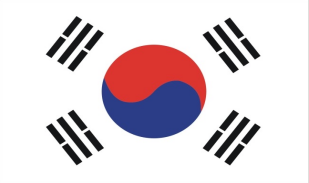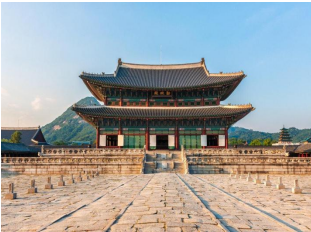National Flag

Landmark construction: Gyeongbok Palace

National History
. It is a Main articles: History of the Korean Peninsula, History of the Republic of Korea
In August 1910, Japan forced the Korean Empire to sign the " Japan- Korea Merger Treaty ", formally annexing the Korean Peninsula.
On April 11, 1919, the " Provisional Government of the Republic of Korea " was established in Shanghai, China. After the outbreak of the Anti-Japanese War in China, the Provisional Government of the Republic of Korea traveled to Hangzhou, Jiaxing, Zhenjiang, Changsha, Guangzhou, Liuzhou, Qijiang and other places, and arrived in Chongqing in 1940 . [7] The current Korean government takes 1919, when the provisional government was established in Shanghai, as the first year of the founding of the "Republic of Korea". [8] Japan surrendered in August 1945, and American and Soviet troops were stationed in the north and south of the peninsula.
On May 5, the National Intelligence Service of South Korea (hereinafter referred to as the National Intelligence Service) stated that the National Intelligence Service represented South Korea as a full member to join the North Atlantic Treaty Organization (NATO) Cooperative Cyber Defense Center of Excellence (CCDCOE) [39] .
member of the Commonwealth.
On August 15, 1948, the southern half of the peninsula established the Republic of Korea, and Rhee became the first president.
Syngman Rhee stepped down in 1960, and Yin Lushan became president in August of the same year .
In 1961, Park Chung-hee launched a military coup and has been in power for a long time since then.
After Park Chung-hee was assassinated in 1979, Chun Doo -hwan staged a coup and became president in 1980.
In 1987, South Korea amended its constitution and implemented direct presidential elections . In the same year, Roh Tae -woo was elected as the 13th president. Since then , Kim Young-sam , Kim Dae-jung , Roh Moo-hyun , Lee Myung-bak , Park Geun-hye , Moon Jae- in and Yoon Sek -yue have been elected as the 14th to 20th presidents. [3]
In July 2021, the United Nations Conference on Trade and Development approved the change of South Korea's status at the 68th session of the Trade and Development Council, officially identifying South Korea as a developed country [6] . In December, the Korean government will start the domestic process of joining the Comprehensive and Progressive Agreement for Trans-Pacific Partnership (CPTPP) [35] .
Country Basic Information

Food Industrial Specific Information
Government
Food organizations
Standards, Policies and Regulations
Approval Export List (Traditional Trade)
Approval Export List (Cross border E-commerce)
Approval Export List (FTA Agreement)
Recommended Featured products
Recommended EFLine Members
Export-oriented Exhibition
Import-oriented Exhibition
Comprehensive Exhibition
The Customs Data
Consumption Data
Sales & Marketing Data
EFL Reports
Collective Analysis Reports
Regional Relations
Industry Policy
Supply and demand fluctuation
Force Majeure Events
EFL Reports · Collective Analysis Reports · Bilateral Trade
[Bilateral Trade] China and the ROK have natural advantages in developing bilateral trade due to their geographical proximity, cultural affinity, convenient transportation and logistics and frequent personnel exchanges. At the same time, our two economies and industrial technologies are at different stages of development, which is conducive to mutual complementarity and win-win results. Since the formal establishment of diplomatic ties in August 1992, China-ROK trade has overcome two economic crises and maintained rapid growth. After exceeding US $200 billion in 2010, it exceeded US $300 billion in 2018. According to Chinese customs statistics, in 2019, bilateral trade volume between China and the ROK was $284.58 billion, down 9.2 percent year on year. Among them, China's exports to the ROK amounted to US $111.0 billion, up 2.1% year on year. Imports reached US $173.57 billion, down 15.2% year on year. China is South Korea's largest trading partner, import source and export market, while South Korea is China's third largest trade destination and the largest source of imports. The top three goods South Korea imports from China are electric motors and electrical equipment and their accessories, nuclear reactors, boilers and machinery and their accessories, and steel. Imports in 2019 were 39.24 billion US dollars, 14.60 billion US dollars and 5.38 billion US dollars, up 12.4%, -5.8% and -5.6% respectively, accounting for 36.7%, 13.6% and 5.0% of South Korea's total imports from China. Among the major goods South Korea imports from China, mechanical and electrical products and their accessories have seen a large increase. In the import market of labor-intensive products such as raw materials, furniture and toys, China continues to maintain its advantage in the South Korean market.
According to Chinese statistics, the bilateral import and export volume of goods between the ROK and China in 2020 will be US $285.26 billion, an increase of 0.3% over the previous year. Among them, South Korea's export to China was US $172.76 billion, down 0.5%. Imports from China were $112.5 billion, up 1.4 percent. South Korea's trade surplus with China is $60.26 billion.
Food Industrial Specific Information · Government
Chinese Embassy and Consulate General in the ROK
Embassy of the Republic of Korea
Ambassador: Xing Haiming
Address: No. 27, 2nd Myeongdong Street, Seoul, Republic of Korea
2 Gil 27, Myeong-dong, Jung-gu, Seoul, The Republic OF Korea
Zip code: 110-033
Website: http://kr.china-embassy.org
http://kr.chineseembassy.org
Telephone: 00822-7381038
Fax: 00822-7381059
E-mail: chinaemb_kr@mfa.gov.cn
Consulate General in Jeju (Korea)
CONSULATE-GENERAL OF THE PEOPLE'S REPUBLIC OF CHINA IN JEJU
Consul General: Wang Luxin
Address: 568-1 Dodo Nam Dong, Jeju City, Jeju Special Autonomous Region, South Korea
(568-1, Donam-Dong, Jeju-Si, Jeju-Do, R.O.Korea)
Zip code: 690-029
Country code: 0082-64
Contact number: 0082-64-900-8830/8840
24-hour telephone number on duty: 0082-64-722-8802
Fax: 0082-64-749-8860
Email address: chinaconsul_jeju_kor@mfa.gov.cn
Website: http://jeju.chineseconsulate.org/chn/
Consulate General in Gwangju (Korea)
CONSULATE-GENERAL OF THE PEOPLE'S REPUBLIC OF CHINA IN GWANGJU
Consul General: Zhang Chenggang
Address: 919-6 Pandi, Moon Caves,Wolsan-dong,Nam-gu,Gwangju,South Korea, 503-230.
Country area code: +82-62
External business consultation telephone: +82-62-385-8873/4
Consular number: +82-10-2896-8816
24 hours on duty: +82-10-2351-2110
Fax: + 82-62-385-8880
E-mail: consulate_gwangju@mfa.gov.cn
Website: http://gwangju.china-consulate.org
Consulate General in Busan (Korea)
CONSULATE-GENERAL OF THE PEOPLE'S REPUBLIC OF CHINA IN PUSAN
Consul General: Guo Peng
Address: P1418, Yoo 2 hole, Haeuntae District, Busan, Korea
1418 U-2 Dong, Haeundae, Busan, Korea
Zip: 612-022
Country code: 0082-51
Telephone:
Inquiries: 743-7985, 743-7990
Office: 743-7983
0082-11-592-8745 (on duty)





